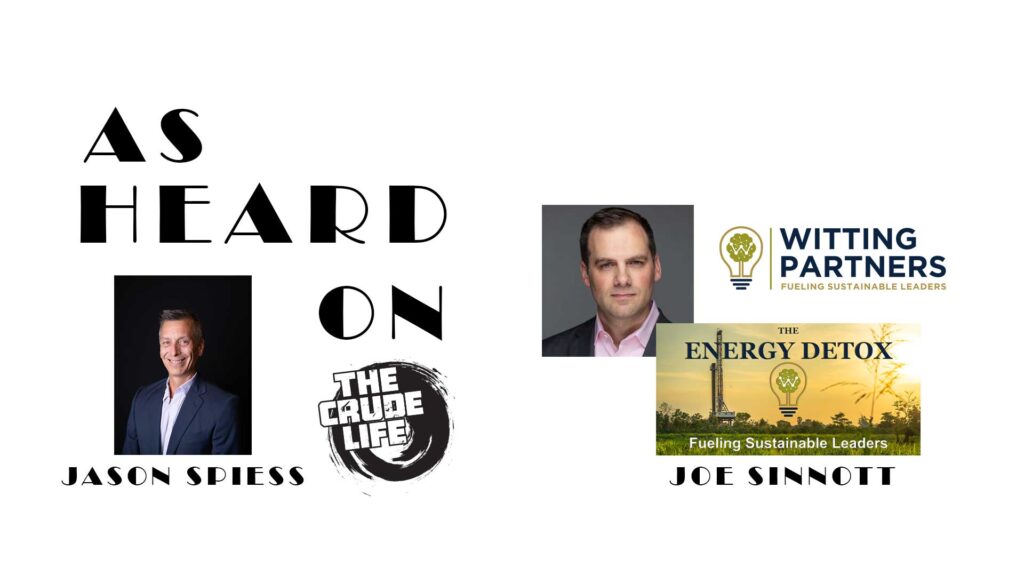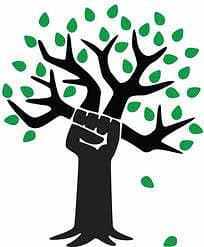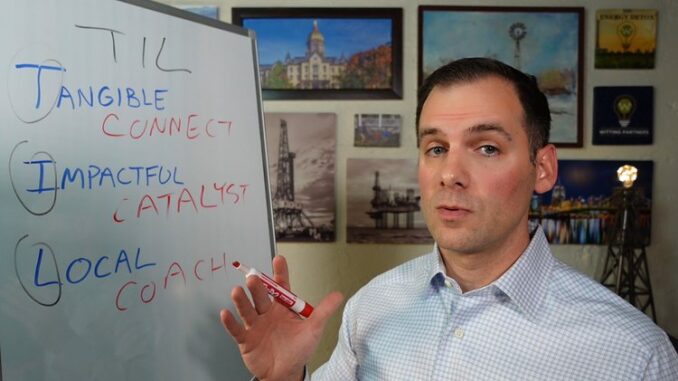

The Executive Coach to Real Life Rock Stars Joe Sinnott of Witting Partners and host of The Energy Detox Podcast joined Jason Spiess for an update on the Appalachian Marcellus Utica Basin as well as comment on the recent release of CNX’s Appalachia First Vision.
Sinnott and Spiess also take a stroll into Toxicity and how it is impacting the workplace. Spiess put on his “holistic helmet” in order to become the Shale Play Prophet and predict that 2023 will be the Year of Toxicity. People will be personally and professionally cleansing their environments, according to Spiess. Sinnott agreed with the toxicity prediction, but looked at the solutions and road out a little different than Spiess.
Today CNX Resources Corp. (NYSE: CNX) launched “Appalachia First,” its vision for the future which draws on the company’s regional leadership, core operational strengths, and innovative business model.
As the region’s premier low carbon intensive natural gas development, technology, and applications company, CNX is uniquely positioned to help revolutionize Appalachia, one of the world’s most energy abundant regions, into an energy, manufacturing, and technology hub of the future.
CNX President and CEO Nick DeIuliis said, “The nation and world are waking up to stark energy realities: energy scarcity, deterioration of our power grid, and energy inflation stoking wider inflation. Policy often relies too heavily on applications such as wind, solar, and electric vehicles that can present large life cycle carbon footprints, require supply chains stretching thousands of miles, are costly, and face serious challenges when scaling in regions like Appalachia. If we don’t get energy and climate policies right, our economic competitiveness will be stifled, the environment will be worse off, and we will end up enabling our adversaries to wage war and forcing leaders to negotiate energy supplies from dictators and despots.”
Mr. DeIuliis continued, “There is a better, simpler, and more logical way. Appalachia can be the launchpad to a more efficient and sustainable future catalyzed by lower carbon intensity natural gas. This proud region and its people should be the solution to deliver reliable and affordable energy – our region’s abundant energy resources can and must be used more effectively to prioritize the improvement of the human condition, the environment, the nation, and the world. In other words, put our local communities first and watch what happens. We believe the strategic approaches integrated throughout this vision represent a clear roadmap to transform key sectors of our economy and workforce while also changing the world for the better.”
Specifically, Appalachia First is rooted in three key objectives:
- Leverage CNX’s and Appalachia’s natural gas opportunity by bolstering all sectors of the economy through lower-cost, lower-carbon, and locally produced natural gas.
- As one of the largest, most efficient, and environmentally sustainable sources of natural gas in the world, Appalachia (consisting of Pennsylvania, Ohio, West Virginia, and Virginia) are equipped with the tools to lead the sustainable revolution touching all sectors of the economy – including energy, manufacturing, technology, and transportation.
- Develop and deploy a new wave of innovative technologies and enhance local communities by using natural gas product derivatives for vertical market growth.
- Combined with new technology and derivative products, natural gas catalyzes a more sustainable future. CNX and Appalachia can fuel new industrial and manufacturing growth through local natural gas derivatives by:
- Using proprietary technology to change manufacturing processes for the extraction and delivery of natural gas.
- Capturing and converting GHG into sustainable products and applications.
- Jumpstarting the local hydrogen economy.
- Transform the sectors of aviation, plastics, rail, cargo, mass transit, trucking, and fleet and passenger vehicles by displacing higher carbon fuels with locally produced natural gas.
- The U.S. is the world’s largest producer and a net exporter of petroleum and natural gas products, but we still import a lot of foreign oil that can be supplanted with CNG and LNG to transform the region’s hard-to-abate sectors.
“From our founding more than 150 years ago, CNX has a rich history of innovating and bringing new technologies to market to meet the evolving energy needs of Appalachia and the world,” said CNX President of New Technologies Ravi Srivastava. “This strategy – focused on sustainably creating new local jobs and economic activity – embodies our mission of delivering benefits that are Tangible, Impactful, and Local.”
The full Appalachia first plan is available at: https://www.positiveenergyhub.com/appalachia-first
Headquartered just outside of Pittsburgh, the company is a leading Marcellus and Utica Shale producer with operations in Ohio, Pennsylvania, Virginia, and West Virginia. As part of the company’s sustainable business model and commitment to ESG excellence as well as shareholder value creation, CNX has made strategic investments in alternative fuel ventures as well as workforce development training, sustainable manufacturing, advanced methane abatement practices, and expanded its flagship partnership with the Pittsburgh International Airport. Learn more at cnx.com/news.
About CNX Resources
CNX Resources Corporation (NYSE: CNX) is unique. We are a premier, low carbon intensive natural gas development, production, midstream, and technology company centered in Appalachia, one of the most energy abundant regions in the world. With the benefit of a 158-year regional legacy, substantial asset base, leading core operational competencies, technology development and innovation, and astute capital allocation methodologies, we responsibly develop our resources and deploy free cash flow to create long-term per share value for our shareholders, employees, and the communities where we operate. As of December 31, 2021, CNX had 9.63 trillion cubic feet equivalent of proved natural gas reserves. The company is a member of the Standard & Poor’s Midcap 400 Index. Additional information is available at www.cnx.com.
Transcript from the Podcast
Jason Spiess 00:11
Let’s go to the audio line where we’ve got Mr. Joe Sinnott on the line. He of course, is with Witting Partners. He also does The Energy Detox. And that’s what we’re going to be talking about today, because in his most recent episode, he’s talking about something that’s known as TIL: Tangible, Impactful, Local. But in order to get to that, we got to start with what’s going on in the Marcellus that prompted him to do that episode of The Energy Detox. And it sounds like there’s a big local push happening out in the Marcellus Shale play. So, we need to talk to Joe Sinnott about our Marcellus update. This is like a three-for-one entry level question. Let’s make it four for one how’re you doing today?
Joe Sinnott 00:59
Doing all right, Jason got about one dozen days until Christmas getting in the in the holiday spirit and always happy to have a conversation with you.
Jason Spiess 01:08
Well, I was gonna say, you know, in the world of the media, it’s nice when you can like really check three boxes, often one news story. And that’s what this does, we get to promote your new episode, which I like to do, because you stay on top of current trends. I also want to make sure I know what’s going on out in the Marcellus and Appalachian. And you’re a great correspondent for that a trusted voice and we’ll get into some of the work you’re doing with some of the local organizations, but you know, CNX that popped up. So this story actually involves CNX getting into the local, I don’t know, it’s hard to say politics when you’re talking about supporting local businesses. That’s just you know, community pride, I guess I’m not sure but what’s going on out there in the Marcellus.
Joe Sinnott 01:56
So overall, the Marcellus, you know, continues to click along and produce plenty of gas, although the big story continues to be that it’s not able to produce as much gas as it could because it’s constrained by pipelines. So, you know, one of the big themes out there is, hey, how do you get, you know, the regulatory bodies sort of out of the way, or at least on board with continuing to develop this resource in a way that allows it to potentially exit the basin and, and help others either, you know, just outside our region, whether it’s in New England, or in some cases, you know, beyond our borders overseas. And with the announcement that you’re sort of alluding to this week, from CNX Resources, they came out and shared their vision and said, Hey, we can obviously support the world with natural gas that’s produced here in the Marcellus. But before we hone in and focus specifically on supporting the rest of the world, let’s make sure that we’re leveraging this resource right here in Appalachia and taking full advantage of it. So that’s sort of the buzz this week with CNX’s recent announcement, they’re “Appalachia First” announcement, as they’re calling it; and it again, speaks to maybe a differentiated focus on this natural resource that has the potential to transform the world, but obviously can transform sort of our local region, first and foremost. And that’s their message. And, again, it’s a message that I stole, actually, before this announcement; you know, they’ve been talking about this “local” message that’s also “tangible” and “impactful.” But this local message has been a theme of theirs for over a year. And it ties in very nicely to some leadership trends that I’m seeing and some leadership warnings that I offer to others. And so that actually happened to be the episode theme for the last episode of The Energy Detox as you lead the show off with and it just coincidentally happened to be tied into CNX’s updated announcement or updated defining of their mission this week. So maybe a long way to weave in all three of those boxes that you’re hoping to check. Hopefully, I did a good enough job of doing that, Jason, but happy to happy to continue the conversation with that theme, if you’re so inclined.
Jason Spiess 04:01
It was a five bagger because you know, we got the whole “How you doing?” in there too, but also, I’m going through the CNX, kind of their press release here. And they mentioned ESG excellence right in the final paragraph there before they get into the about CNX resources. So what is going on with some of the ESG either the vibe or the talk or with the companies out there, because I gotta be honest, in the Bakken, and in some of the other regions, I’m seeing a lot of mixed messages where a lot of the industry is against ESG. But also they’re still putting out the ESG reports. So I’m not really quite sure what to make about that, Joe.
Joe Sinnott 04:47
Yeah, I mean, in general, obviously, every public company on the planet seems to be embracing ESG initiatives, I will say here in the Marcellus and in Appalachia as a whole clearly there’s a lot of focus on what they are doing specifically for the communities in which they operate. So, you know, there’s different companies out there: Diversified Energy is a good example, over the last week or so, I think there’s been three or four clear, specific big initiatives that they’ve been touting, as Turkeys and Toys for Tots and 10,000 trees they donated; things like that, that, hey, emphasize, we’re not just going to talk generically about ESG. But we’re going to really hone in on impacting the local environment, impacting the local society, if you will, and checking the social box, if you will. So I think a lot of companies again–this is not unique, necessarily–but they really want to tout Hey, this is what we’re doing for the specific community. CNX, again, last week, this was the genesis for The Energy Detox podcast episode, they announced that they were donating $1 million to support the expansion of broadband in a county here in southwest PA that is fairly rural. So giving them access to the internet, and all of the things that that then leads to that that catalyzes, if you will. So again, I think you’re you know, you’re seeing something that’s common around the holidays, too, right? You know, hey, “shop local,” that’s, you know, you open that up at the beginning, right, hey, shop local, this is what we’re doing for the community, not just some generic sounding stuff. And I’ll add that, too, Jason that CNX and their CEO, Nick Deiuliis, they’ve really gone above and beyond and tried to differentiate their ESG message. In fact, their corporate responsibility report is named that…a “Corporate Responsibility Report,” they haven’t gone down the corporate “sustainability” report or “ESG” report for whatever that’s worth. But it really speaks to, hey, you know, we take our responsibility very seriously. And, you know, we’re not just going to talk in generic “sustainability” terms, because what does that word even mean?
Jason Spiess 06:50
That’s the thing that caught my attention was they’re doing a lot like what The Crude Life has decided and gone to do where we’ve never released an ESG report, we just highlight those ESG things that we do on a regular basis. And so when I’m looking at this, the little wordplay, trickery, man, we do the same thing. It’s kinda like, yeah, we’ll play your game, but we’re not going to play you know, Calvinball [a game invented by Calvin and Hobbes where players make up their own rules as they go along)–I heard that last night on Fox News. And when I was out, and about one of the anchors use the word Calvinball, and I thought that is a great way to describe ESG; they just kind of changed the rules to satisfy them. And, unfortunately, we’re in that position right now. So I anyway, so I applaud them for saying, you know, what, yeah, we get the good principles that you’re trying to do. And we’re already doing that. So we’re, you know–I like how they’re not even calling it a corporate sustainability report. They’re not even going down that far. That’s fantastic. But, so, but you know, what I mean, I think there’s value there with that–someone who’s saying, Hey, we’re willing to, you know, play along, but only to a certain point. And I respect that personally.
Joe Sinnott 08:10
Well, to add on to one thing you said, Jason, it’s them and other companies taking credit for what they’ve ALREADY been doing. That’s the funny thing, right? This vision that they laid out, it’s not really any different from what they’ve been saying for the last year, or two or two and a half since their CEO, Nick Deiuliis, has really gotten out there and has really been advocating and you know, getting up on stage–figuratively or literally–and saying all of these things. It’s a bit of a rebrand, if you will, but it further hones that message. Now, they already had that “tangible, impactful, local” message for I think about the last year or so. And this gets even more specific: “What is local?” “What does ‘local’ even mean?” Well, hey, we’re talking about Appalachia, you know, these four states that they highlight, you know, CNX is not just in the Marcellus, they also have significant operations down in Virginia, where a lot of their innovation is occurring; and a lot of their real ESG efforts, in fact, are brewing. And so they’re, you know, continuing to hone in on and redefine and get specific about the things they’re already doing, and in turn, get credit for the things that they’re already doing, instead of going the other direction, and becoming more broad and more vague and more tiresome, which quite frankly, Jason–you know, you cover enough companies, right? How often do these messages start to sound the same and start to become nauseous and soporific and, you know, ready to put you to sleep, right? Whereas a company like CNX is going the other direction, which is what we all should be doing as human beings, right? Getting specific about our message and not falling into the trap of just parroting the same stale talking points that every other company is doing.
Jason Spiess 09:48
You hit the nail on the head right there where people are tired of just the empty rhetoric. They they want to see actions. They want to see examples. They want to know what is going on; and the people who are doing it. Unfortunately, they need to kind of play a little bit of, hey, we’re gonna call it “this” instead of “that,” because they have to stand out from all that ridiculous noise. So I don’t know if you’re a paid spokesman for CNX–I know I’m not–but just Who are they? Are they natural gas? Do they do any oil? There’s been so much changes that’s happened out in the different shale plays, you know, especially with Coterra–that was the big merger out there. So who is CNX Resources? Are they primarily natural gas?
Joe Sinnott 10:53
So CNX Resources is primarily natural gas; their origins, though, Jason, go back about 160 years. So they go back to the age of coal. So there was a time not that long ago that it was Consolidated Coal Company; and then you go back a couple of decades, and they realized that, hey, you know, there’s methane in the coal mines; and methane was the enemy of the coal miner. And so you want to release that methane before you would go ahead and mine and at some point they said, “Hey, wait a second…this natural gas, this methane, has value; so then you begin to capture it and intentionally extract it. And that got them into the natural gas game, if you will. And then fast-forward to the early 2000s, when the Marcellus is just starting to rear its head and it made sense, then–you already have this asset base, you already have some of this land–to then transition that natural gas development focus into extracting gas from the Marcellus. So you know, they got into the horizontal shale development. And since then, they’ve separated the coal company from the natural gas company. So CNX resources, as it is today, is a natural gas company, although they still do have assets down in Virginia, which are not Marcellus assets, but they still have CBM–coal bed methane–assets down there. And they are still doing a lot of work in terms of capturing methane from mines. And again, capturing that methane–which is obviously good for the environment, from a from an ESG standpoint, from a global warming standpoint–and they are partnering with other companies (and this is all public information) to take that methane and actually turn it into goods and products that we all use, whether it’s new forms of plastic, if you will, that are biodegradable, and that, again, check all of these ESG boxes in a very real way, in a very tangible way that actually boosts the profile of and the contributions to the world that Appalachia has the ability to do.
Jason Spiess 12:54
“TIL: Tangible, Impactful, Local…the mantra of the CNX Foundation is clearly reflected in the $1 million commitment that CNX is making to broadband expansion in Greene County.” [reading from show notes for recent episode of ‘The Energy Detox’] That’s a great way to put it because, for me, I’m in the communication business. And when we started The Crude Life, you know, we had other aspirations of, you know, the crude life coffee, the crude life clothing, all kinds of different things. But because of my education, because of my background, because of my American upbringing, the communication business is the way to start. You need to get your message out there. And so, investing in broadband, investing in communication abilities is such a fantastic way to go. In fact, in warfare, what they say is one of the first things that you do is you take out their communication towers; that way that people can communicate with each other. So you can see how on both sides of the coin it can become extremely important with what you do. Now, when I take a look at, you know, they’re tangible, impactful, and local. There’s also a political side of this, which is, they raised a good point, Joe, which is why are we investing so much money in the global energy…”grid,” I guess, when we have our own energy grid that really needs to be taken care of here? So what is their message or your interpretation of what they’re trying to get across to either the industry or the local people or the professionals out there?
Joe Sinnott 14:38
Well, I think, my interpretation–and again, this is just my interpretation…I’m certainly not speaking on behalf of CNX in any way, shape, or form–but my interpretation is, who cares about the impact, you know, beyond our borders when we have enough challenges here and when we have these opportunities here? That doesn’t mean you ignore the rest of the world, of course. And in fact, if you go through CNX’s materials from the recent release, they talk about that we can absolutely have a positive impact on the rest of the world. But why wouldn’t we start here first? And I think my–again, interpretation–of why this matters, is because when you’re talking about talent, and you’re talking about getting people on board–and you just mentioned the word politics, right?–we’re talking about getting politicians on board, shouldn’t we be focused on giving them a message that DIRECTLY ties to their constituents to get them to pay attention? I mean, it’s one thing to talk about saving the planet from the dangers of global warming…and we’re gonna do all of these things that may or may not have an impact 50 years from now. Yeah, okay, you could talk about those things. I’m not saying they’re not real. But what about doing something that’s actually going to have a tangible impact within the next, say, five years on the people that actually live here? And a great example of that, Jason, coming back to the Marcellus region is the Shell cracker plant; This was years in the making, billions of dollars of investment, the Shell cracker plant finally went online here a couple of weeks ago. And it’s a huge, huge boon for the local economy; that is a tangible, impactful, local impact that clearly, politicians cannot ignore. And when you have their attention, then you can say, hey, here’s what else you need to do if you want to keep these things rolling. So again, it’s not to shy away from the rest of the world. It’s not to, you know, close our eyes and become protectionist or whatever. But it’s simply saying, Hey, before we help the rest of the world, or the rest of the country, why don’t we help ourselves and take advantage of the resources we have; take advantage of the history of innovation that we’ve had here in Appalachia for the last 150+ years? And do it in a way that actually transforms all of these industries: whether it’s aviation, plastics, transportation, whatever it is; why don’t we do all that transformation here? Because it’s simpler–right, Jason?–instead of trying to transform, you know, the other side of the world? Why don’t we start by transforming the people and the industries and the makeup of our communities that are, you know, 10s, or maybe hundreds of miles away, not 1000s of miles away. So, you know, that’s my interpretation, if you will–or summary–of what I’m reading and I’m seeing out of CNX. And I think, again, looking at this through the lens of a leadership coach, it’s the type of approach and vision that successful leaders have; where they focus on the here and now and what’s in front of them instead of [giving in to] the urge to broaden their message to look beyond and to, you know, unwittingly come across as ignoring what’s right in front of them–which in many cases, Jason, is their people, their teams. So in this case, again, CNX is clearly saying, Hey, we’re focused on our people, and Appalachia, our teams that are driving this forward; and our commitment is to you first…and then we’re all together going to help transform the rest of the world.
Jason Spiess 17:51
A, quote Lee Tillman, CEO of Marathon on this very program here, it takes a lot of resources to ship a molecule across continents. So being local with your energy is the cheapest way to go. So understand the need for exporting but at the same time, turning your back on your own citizens and country and everything like that does make it political. It really does. You know, as long as we’re doing a little bit of political, I gotta have some red meat. What’s going on with that Fetterman guy? I saw the he wears hoodies and stuff, huh? He just kind of dresses. Like, like my son on the weekend.
Joe Sinnott 18:43
Oh, I don’t know, Jason after he was elected, he was spotted wearing a suit. I think when they had their orientation or whatever, down in Washington, but he has totally disappeared from headlines here.
Jason Spiess 18:55
I think first big acting role he has I saw he’s an actor now, too.
Joe Sinnott 18:59
Oh, he’s a jack of all trades. There’s really no title, Jason, that can accurately define Senator-elect John Fetterman from here in the Commonwealth of Pennsylvania.
Jason Spiess 19:13
Well, he’s gonna be in a movie in a movie with Christian Bale. I did see that. That, you know, that was kind of a good deal for him. But is he at all reaching out to the energy industry at all out there? Or is he just busy, you know, kind of just still soaking in the limelight and the fame stuff?
Joe Sinnott 19:30
I can’t say what he’s been up to. I can’t speak to how much outreach he’s had since being elected, although I don’t get the sense that he was doing a heck of a lot of outreach before being elected. But I will say one thing, it’s interesting you bring up John Fetterman, because some would argue that one of the reasons that he was elected is that he arguably took this this hyper “local” focus, right? I mean, whether it was you know, warranted or not, he came across as the Everyman, right? In the local community.
Jason Spiess 20:02
Yeah, that’s what I’m bringing it up!
Joe Sinnott 20:03
Oh, well, while we’re on the same page…look at that, Jason. I expect nothing else! But yeah, I mean, you got Dr. Oz…Nobody cared about the politics…it wasn’t as important as the image.
Jason Spiess 20:14
…Drinking tea at a beer kegger. Absolutely, man. So he came off as the wrong way. Absolutely. Yeah. But I find it interesting because that’s what Fetterman won on was the local image. And so when you bring this up, it again just seems like there’s more contradiction amongst the leadership. So, Joe, this is what you do for a living man, you put leaders on the right path, give yourself a plug quick.
Joe Sinnott 20:44
Well, hey, look, my role is behind the scenes, kind of like John Fetterman. I’m, you know, hanging out in my basement and, trying to make a difference–Maybe making a pitch for myself and drawing parallels between John Fetterman is not the way to go…But you said “put people on the right path.” I don’t put people on the right path, Jason; I’m working with individuals within the energy industry who are already on a good path or they’ve been on a good path. My job is to help keep them on the right path or to help make decisions easier and more confidently that are in front of them as far as which way to go next; which fork in the road to take–to quote Yogi Berra. So, you know, the way I do that, Jason is by asking questions, getting to the heart of what their ultimate purpose is, helping them understand when they are getting too broad or too vague, when their people are looking at them and feeling like maybe they’re being abandoned, helping them understand when those occasions are happening, and then pulling them back on that path that they’re likely already on; and, more importantly, helping to get other people on that same path moving in the same direction. So again, the way I do that is by being embedded in the energy industry, understanding the technical challenges, the political challenges, the corporate challenges, the business challenges, having been a part of that industry, having been in that technical role and those leadership roles; taking those experiences to ask better questions of individuals so that when they drift off that path–or they’re feeling like they’re going to drift off the path–bringing them back and saying, “so what, why does this matter? Why does this initiative matter? Why is this this sexy, new leadership messaging that you’re delivering to your team…why do you actually think it’s going to make a difference?” And [then] having them hone in on the things that actually will make a difference, the things they can say, the things they can ask, and more importantly, the things they can do. So, that’s what I do. That’s what I enjoy. Jason; it’s fun, still being part of the energy industry, not falling into the trap of being one of the millions of other generic coaches out there that can help people generate results–I’m not trying to bash other coaches. But you know, being embedded in this industry, particularly here in Appalachia, it’s a heck of a lot of fun, helping, quite frankly, companies do the types of things that CNX is trying to execute upon, which is innovate, take advantage of their local resources, not reinvent the wheel. And I think you used the word “easier” earlier, Jason–help make being a leader easier. Because it doesn’t have to be complicated. It shouldn’t be complicated. But one of the biggest hurdles that leaders face is overcomplicating leadership, and missing out on the simple things they can do, which is focusing on their people, focusing on existing resources, and, quite frankly, doing those “local,” small, but visible things that people actually care about.
Jason Spiess 23:36
Time now for the shale play profit–the prognostication segment as we wind down the year 2022 and we look ahead to 2023; and the shale play profit–if I’m putting on my hard helmet, the holistic helmet that allows me to see into the future. I see a lot of toxicity in the next year, Joe. And that’s mostly because of social media, in my opinion, to where companies, until they get a handle on their social media policies on what their employees are doing during the day. It’s like a smoke break where you can just pick on people or promote certain people or it’s really the Wild West. So I personally, I think social media, and just kind of the wild west of it right now is creating a lot of toxicity in workplaces. Maybe it’s because now that people are bringing back the workplace and people like working at home, maybe that’s part of the toxicity reasons. Everybody might have their own little, you know, slice of the pie, if you will. But at the end of the day, I think the pie being presented in 2023 is going to be toxicity in the workplace through a variety of different ways. I know that your business actually can help with that. So I’m not trying to plug your business in that way, but at the same time, hey, serendipitous or not, let’s talk about it. Do you have any prognostications for next year? And let’s talk a little bit about the toxicity and workplace view in mind.
Joe Sinnott 25:14
As far as prognostications, I agree with the toxicity prediction, if you will, Jason, but I don’t think it’s going to come from, you know, people hating each other necessarily; I think it’s that the toxicity–or sort of the nausea-inducing social media that’s out there…we talked about it earlier, right?–these generic messages from companies; I think, at some point, it’s going to come to a head, and individuals, whether they’re current employees or prospective employees, they’re going to be looking for companies with a differentiated message that sounds a little bit fresher, that isn’t just overly polished and, you know, comes across as sort of nothing or sounding the same as everybody else. So my prediction–and I see some of this now, I see rumblings within companies where it’s, “Hey, how can we differentiate our message? How can we get our employees out on social media more in a way that is actually more natural and positive,” but doesn’t come across as forced, doesn’t come across as them just copying and pasting scripts that the company gives to them? I think that’s the holy grail for a lot of companies. Jason, and again, it’s sort of a–not a direct toxicity, necessarily. It’s not an overt toxicity. But it’s that toxicity that comes when it sounds like people are just talking generically. I mean, I hate that. And again, I’m not saying I haven’t been on my soapbox talking in some vague terms today. But you know, when I’m working with leaders, that’s the number one thing I’m on the lookout for; are you just saying these generic, trite, cliche leadership things–you read four leadership books, and now you think you’re an expert? And you know, your employees aren’t stupid; they want you to talk to them in real terms. And I think companies have an opportunity to do that, to attract talent and to retain talent. So I think companies are going to do that, like I said, because some companies are starting to do that. So there’s my there’s my 2023 prediction: I think you’re gonna see some pretty clear attempts at unleashing the real people working within these organizations.
Jason Spiess 27:16
Yeah, I think what is happening, I guess, just kind of existentially–if we’re going to do a little existential energy–The woke culture is happening in so many different areas that people are just awakening. And what they’re awakening to is an authenticity of themselves. And so they are questioning a lot more things. And, you know, it can be you know, everything from the supply chain, did the Titanic really sink? I have no idea. I mean, what people are doing. So I just know that a lot of people are educating themselves in a variety different ways. And people are, you know, waking up and woke culturing in their own way. And at the end of the day, what they’re looking for is truth and authenticity. So those companies that are able to do that are the ones that in my opinion, are going to navigate through this toxic sea that we seem to be going into. I don’t know if you want to comment on that at all.
Joe Sinnott 28:19
Yeah, I’ll add one thing, because “authenticity” is another one of those buzzwords; it’s real, and it’s important, and leaders absolutely need to embrace authenticity. But then the question is, “how?” Right, Jason? How do you demonstrate authenticity? And one of the best and most effective ways to do this–to generate actual results is to connect what your stated vision is, what your stated mission is, what your corporate talking points are…connect that back to the work that the individuals are doing. So it’s, “why does any of this stuff matter?” And again, it comes back to what we talked about at the outset…and throughout this conversation, it’s that “local” idea, right? Not local from a, you know, community standpoint (hey, we donated X dollars to the local, whatever, 4H club or whatever it is–it’s to you as an individual employee; how is what the company’s doing make a difference in your world, and how is what you’re doing make a difference in what the company’s bottom line is? So often, Jason, companies fail to make that connection. There’s, you know, silos…talk about silos, again, another generic term that millions of coaches are going to talk about: “we’re gonna knock down silos!” But it’s not just the silos between operational groups. It’s the silos between, you know, the people in the in the C-suite or the marketing department that are putting this stuff out…and obviously, the workers who have their boots on the ground, that are in the field, that are on location that are doing things; those are the connections that you need to make internally. It takes time, it takes energy, but when you build those authentic connections that are strong and clear and quantifiable, that’s the key for these companies, Jason; and, again, there’s some real ways to do that. It’s not complicated, it…can cost a heck of a lot less money than then some slick marketing campaign. So, that’s it–you hit the nail on the head with “authenticity,” but it’s how do you demonstrate it?
Jason Spiess 30:19
Well, I think a lot of these companies like CNX, that we were talking about earlier, is they’re just showing and illustrating and citing examples of the body of work–what’s already been done. And when you can do that, versus “we’re gonna be gonna be gonna be,” I always called that the bartender–that the bartender is always going to be doing something, I mean, all you got to do is listen to them, and they’re so charming, because they’re just constantly dreaming, they’re gonna be gonna be gonna be, well, at some point, you got to put it into reality. And I think that is coming home to roost in a lot of people; and what I mean by that is–and Joe, are you ready for your next interview right here on The Crude Life, because this is a topic that we should do a cross-promotional podcast and figure out how to do that, because it’s so good. It needs to have two different sources to distribute the sucker through because we’re working on a column right now for our ESG University. And we’re flat out asking the question, you know, did you hire Milli Vanilli, Vanilla Ice, or Queen? Because Milli Vanilli, they didn’t even write the music or sing the music. So they just copied and pasted everything. Okay, Vanilla Ice, he changed one note, he changed one note, and he was a one hit wonder. So Queen, who seemed to not be the cool band during all that time, they were the ones that were putting together their legacy. So did you hire, you know, Freddie Mercury and Queen? Who’s actually the person who’s producing the content and the real talent and putting it out? Getting the job done? Whatever it might be? Or did you get Vanilla Ice? Who changed one note claimed it as their own? And now they don’t have anything? Or was it Milli Vanilli–who, by the way, Milli Vanilli might work the best, especially with the overseas Asian outsourcing that you can do for five bucks, you could have your own personal assistant, you could do a whole bunch of things in the Milli Vanilli world nowadays. So we’re gonna, you know, that’s how we’re gonna approach it. We’re not we’re gonna look at all the pros and cons. So just kind of, you know, your thought on that a little bit when it when it comes to employees and trying to determine, you know, what did I hire here? I mean, there’s a workforce shortage everywhere. So people are getting desperate. They’re just grabbing people. And it’s tough to get by that initial, you know, sizzle, if you know what I mean.
Joe Sinnott 33:02
Yeah, and again, it’s–I do love that it’s tied into your ESG university classes or whatever, because it’s “sustainability,” right? It’s all of those three employees or employee groups…who’s the most “sustainable?” Because the first two, yeah, they can generate results. And that’s where, again, a lot of leaders get misled, right? Oh, we’re all about “results” here. Look at the bottom line results. Well, you know, hey, look at the record sales for those…for Vanilla Ice and Milli Vanilli and all this stuff. You could say, hey, look skyrocketing and look at this growth, whatever. But the results can be misleading. It’s one of the huge themes in the work that I do is that results don’t always speak for themselves. And again, that’s where a lot of leaders become unconscious. You know, they’re, unaware, they’re unwittingly latching on to results, because it seems easy. It seems safe. It’s what everybody else is doing. And it points to the fact that Milli Vanilli, Vanilla Ice…”oh, no, no, those are the ones you want on board.” Meanwhile, yeah, Queens chugging along, actually doing great work. And people aren’t asking the right questions. And now you got a whole team of Milli Vanilli’s and Vanilla Ice’s and, again, it’s not sustainable. So, you hit the nail on the head. The other thing you said, Jason, was maybe going back to taking advantage of the stuff you’ve already done–your body of work, that foundation…you take a company like CNX, and it’s actually kind of funny, because a year or so ago, they started calling themselves, “net zero or carbon negative” and I think at least maybe scope one and scope two emissions, because they have that methane capture program–that coal mine methane capture program. So they’re saying, hey, you know what, we’re already at zero, right? Or we’re carbon negative already. “What next?” Which again, is just a funny way to say, hey, look, we’re already generating results. We’re doing these things already. We’re not just going to lean on promises of what’s going to happen 50 years from now; we don’t have “a plan to come up with a plan” to be net-zero in 30 years “maybe if the stars align” and ever thing else. No, they said, hey, look, this is what we’re doing right now. And so when you combine current real results with that foundation that an entity like Queen has, you put those together and you’re on a sustainable path. And that’s what you want to be as a leader; you want to take advantage of existing resources. Yes, you need to generate some short term results. But you need to make sure that you’re always taking full advantage of that foundation, strengthening that foundation, and being on guard against the things that can chip away at that foundation. You need to protect the things that actually matter. And again, that’s where, a lot of the coaching that I do comes into play…making sure that people aren’t unwittingly opening themselves up for that foundation to crumble or for people to start casting stones unfairly at you, which could lead to your your message getting lost and your your ultimate demise as a leader and then, in turn, as an organization.
Jason Spiess 35:54
Milli Vanilli, of course, won the Best New Artist Grammy. How many Grammys did Queen win?
Joe Sinnott 36:04
I don’t have an answer for you today, Jason.
Joe Sinnott 36:06
Well, the best is the people that stumble upon thinking it’s some sort of cleanse, you know? They had a late night of drinking and they’re looking for some sort of detox and they stumbled across it; but either, way we welcome people however they came across it; we welcome everybody.
Jason Spiess 36:06
And that is the correct answer: zero. So there you go, folks, Queen did not win any Grammys, did not get recognized as one of the best bands in their particular industry. But Milli Vanilli who did not even sing or write the song got the Best New Artist Award. So that is a whole ‘nother topic for another day. We could talk about organizations and awards and all kinds of things. But again, let’s just kind of circle back here and kind of do a little bit of a wrap up here. So great talk today on a number of things. Of course, you’ve got your podcast, The Energy Detox, that’s just gaining more popularity because people in the industry love it and, of course, people outside the industry, they liked the name so they check it out and they find out “oh, this is just useful stuff for every day…Doesn’t matter if I’m in the industry or not. This was great.”
Jason Spiess 37:16
That’s why you were doing yoga the other morning…I was wondering why that podcast had yoga, but now I get it…your energy detoxing, appeasing that audience…look at you trying to…I’m joking people out there. Okay. All right. So what was the other thing I was gonna ask you? Let’s see. Oh, are you still doing the kind of the moderating role for, is it, the Society of Petroleum Engineers that you are doing that for?
Joe Sinnott 37:43
Yeah, the Society of Petroleum Engineers, SPE, they have Tech Talks, it’s a live show. They have it about two times a week, I’m hosting maybe three or four times a month. So still doing that, still moderating; fun way for me to, again, stay abreast of latest technological developments in the world of oil and gas. Which, again, for those listeners of The Energy Detox, you know that we like to weave in current technology in oil and gas along with current headlines and political themes and leadership themes and kind of bring them all together in a way to help you think more clearly and make better decisions. So, yes, still happy to be a part of that. And welcome folks to check that out as well…go ahead and follow Society of Petroleum Engineers on LinkedIn is probably the easiest way to see as episodes pop up there; and you can watch them live and interact live. And you can go to their streaming.spe.org site as well and check them out there.
Jason Spiess 38:40
Well, there, you got your homework; we are going to have our next podcast as a cross-promotional podcast in some way where we’re going to talk about the Milli Vanilli, the Vanilla Ice, and the Queen employee. Maybe we’ll add some more bands. All I know is the hits are just going to keep coming, Joe. That’s all I know.
Joe Sinnott 39:01
All right. Well, there are a few conversations I can think that I would be more excited to have, Jason, so I look forward to the next rendition of The Crude Life with you.
Jason Spiess 39:10
Outstanding man, well, how can people get a hold of your content? What’s the website?
Joe Sinnott 39:17
Always happy to connect with folks on LinkedIn, of course, but you can also navigate on over to WittingPartners.com; or if you’re interested in checking out The Energy Detox, you can go ahead and find that on whatever your favorite podcasting platform happens to be, as well as YouTube and a couple other places if you use the ol’ Google.
Jason Spiess 39:42
Well, make sure to Ask Jeeves it and Alta Vista my way to the energy detox podcast. There you go, folks. There’s some mid-90s humor for you. And yeah, awesome, man. Well, we’ll talk down the line, sir.
Joe Sinnott 39:57
All right. Well, thank you, as always, Jason. Hope you have a great day…and remember, as we head closer to Christmas here, you want to “shop local,” you want to “think local,” and, of course, you want to “lead local.”
About The Crude Life
Award winning interviewer and broadcast journalist Jason Spiess and Content Correspondents engage with the industry’s best thinkers, writers, politicians, business leaders, scientists, entertainers, community leaders, cafe owners and other newsmakers in one-on-one interviews and round table discussions.
The Crude Life has been broadcasting on radio stations since 2012 and posts all updates and interviews on The Crude Life Social Media Network.
Everyday your story is being told by someone. Who is telling your story? Who are you telling your story to?
#thecrudelife promotes a culture of inclusion and respect through interviews, content creation, live events and partnerships that educate, enrich, and empower people to create a positive social environment for all, regardless of age, race, religion, sexual orientation, or physical or intellectual ability.
Sponsors, Music and Other Show Notes
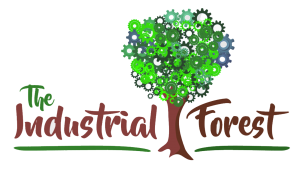
Studio Sponsor: The Industrial Forest
The Industrial Forest is a network of environmentally minded and socially conscious businesses that are using industrial innovations to build a network of sustainable forests across the United States.
Weekly Sponsor: Stephen Heins, The Practical Environmentalist
Historically, Heins has been a writer on subjects ranging from broadband and the US electricity grid, to environmental, energy and regulatory topics.
Heins is also a vocal advocate of the Internet of Everything, free trade, and global issues affecting the third of our planet that still lives in abject poverty.
Heins is troubled by the Carbon Tax, Cap & Trade, Carbon Offsets and Carbon Credits, because he questions their efficacy in solving the climate problem, are too gamable by rent seekers, and are fraught with unreliable accounting.
Heins worries that climate and other environmental reporting in the US and Europe has become too politicized, ignores the essential role carbon-based energy continues to play in the lives of billions, demonizes the promise and practicality of Nuclear Energy and cheerleads for renewable energy sources that cannot solve the real world problems of scarcity and poverty.
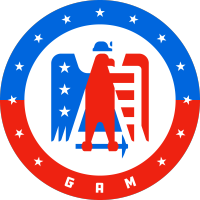
Weekly Sponsor: Great American Mining Co
Great American Mining monetizes wasted, stranded and undervalued gas throughout the oil and gas industry by using it as a power generation source for bitcoin mining. We bring the market and our expertise to the molecule. Our solutions make producers more efficient and profitable while helping to reduce flaring and venting throughout the oil and gas value chain.

Join Podcasters from across the world and all walks of life as they unite to bring civil solutions to life and liberty.

Studio Email and Inbox Sponsor: To Be Announced

Featured Music: Alma Cook
For guest, band or show topic requests, email studio@thecrudelife.com
Spread the word. Support the industry. Share the energy.


